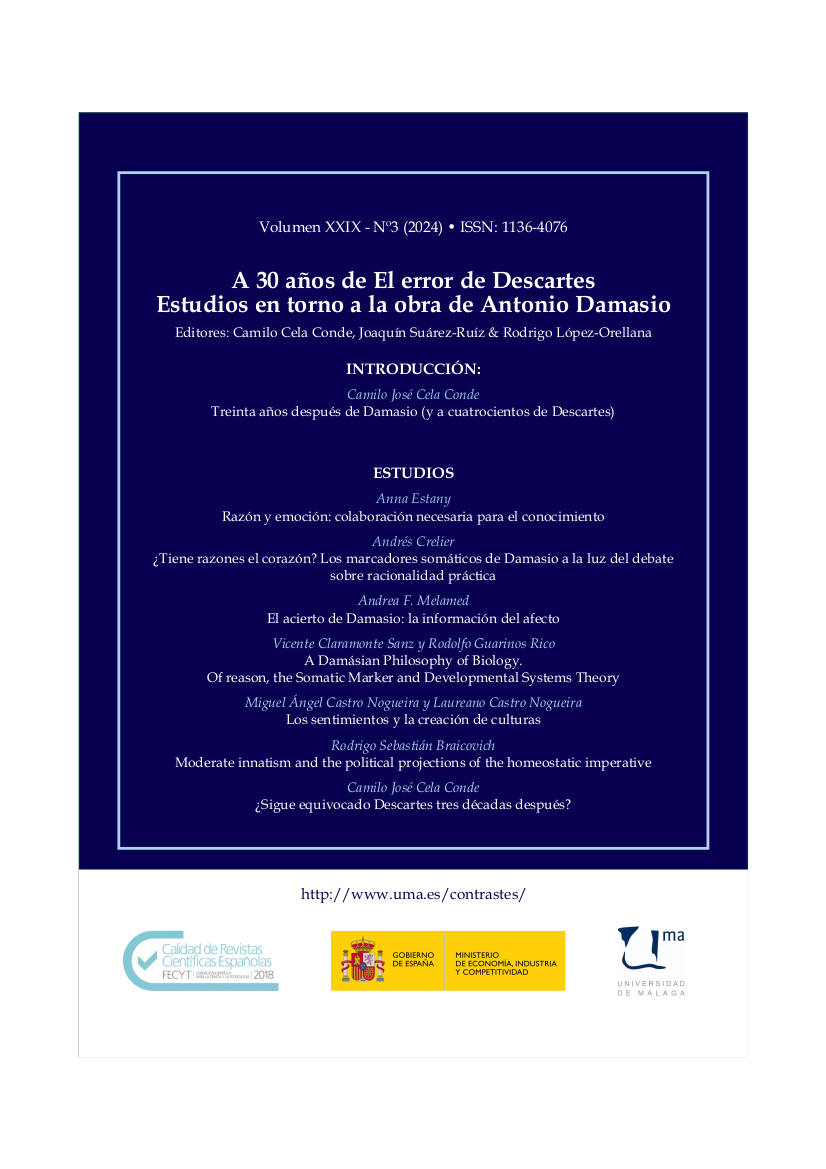Moderate innatism and the political projections of the homeostatic imperative
DOI:
https://doi.org/10.24310/contrastes.29.3.2024.19711Keywords:
moderate innatism, homeostasis, emotions, politicsAbstract
The aim of the paper is to offer a critical analysis of the political projections that Antonio Damasio has put forward of his specific conception of homeostasis. By starting from a complex conception of homeostasis, one that focuses not only on the maintenance of life but also on flourishing, Damasio argues that certain cultures are contrary to the homeostatic imperative. I will suggest that, even if we adopt the complex interpretation of homeostasis (rather than the deflated one that is usual in most evolutionary approaches), resorting to the concept of homeostasis would lead to a condemnation of modern capitalist societies, not from an ethical or political point of view, but from a strictly evolutionary one.
Downloads
Metrics
Publication Facts
Reviewer profiles N/A
Author statements
Indexed in
-
—
- Academic society
- N/A
- Publisher
- Universidad de Málaga
References
Berardi, F. (2016). La fábrica de la infelicidad. Nuevas formas de trabajo y movimiento global. Tinta Limón.
Borowy, I. (2017). Economic growth and health: Evidence, uncertainties, and connections over time and place. In I. Borowy & M. Schmelzer (Eds.), History of the future of economic growth: Historical roots of current debates on sustainable degrowth (pp. 129–153). Routledge.
Büchs, M., & Koch, M. (2019). Challenges for the degrowth transition: The debate about wellbeing. Futures, 105, 155–165. https://doi.org/10.1016/j.futures.2018.09.002
Damasio, A. R. (1998). Descartes’ Error. Emotion, Reason and the Human Brain. Avon.
Damasio, A. R. (1999). The feeling of what happens. Body, emotion and the making of consciousness. Harcourt Brace.
Damasio, A. R. (2003). Looking for Spinoza. Joy, Sorrow, and the Feeling Brain. Vintage Books.
Damasio, A. R. (2010). Self comes to mind: Constructing the conscious brain. Pantheon Books.
Damasio, A. R. (2019). The strange order of things: Life, feeling, and the making of the cultures. Vintage Books.
Fodor, J. A. (1983). The modularity of mind: An essay on faculty psychology. MIT Press.
Hamilton, C., & Denniss, R. (2005). Affluenza: When too much is never enough. Allen & Unwin.
Han, B.-C. (2022). Sociedad del cansancio. Herder.
Kasser, T. (2002). The high price of materialism. MIT Press.
Majeed, R. (2020). Does modularity undermine the pro‐emotion consensus? Mind & Language, 35(3), 277–292. https://doi.org/10.1111/mila.12241
Maté, G., & Maté, D. (2022). The myth of normal: Trauma, illness, & healing in a toxic culture. Avery, an imprint of Penguin Random House.
Pinker, S. (2018). Los ángeles que llevamos dentro. El declive de la violencia y sus implicaciones. Paidós.
Prinz, J. J. (2006). Is the mind really modular? In R. Stainton (Ed.), Contemporary debates in cognitive science (pp. 22–36). Blackwell.
Simpson, T., Carruthers, P., Laurence, S., & Stitch, S. (2007). Introduction: Nativism Past and Present. In P. Carruthers, S. Laurence, & S. Stitch (Eds.), The Innate Mind. Vol. 1: Structure and Contents (pp. 3–21). Oxford University Press.
Downloads
Published
How to Cite
Issue
Section
License
This journal provides immediate free access to its content under the principle of making research freely available to the public. All content published in Contrastes. Revista Internacional de Filosofía, are subject to the Creative Commons Attribution-NonCommercial-ShareAlike 4.0 license whose full text can be found at <http://creativecommons.org/licenses/by-nc-sa/4.0>
It is the responsibility of the authors to obtain the necessary permissions of the images that are subject to copyright.
Authors whose contributions are accepted for publication in this journal will retain the non-exclusive right to use their contributions for academic, research and educational purposes, including self-archiving or repository in open access repositories of any kind.
The electronic edition of this magazine is edited by the Editorial Service of the University of Malaga (Uma Editorial), being necessary to cite the origin in any partial or total reproduction.










5.png)
